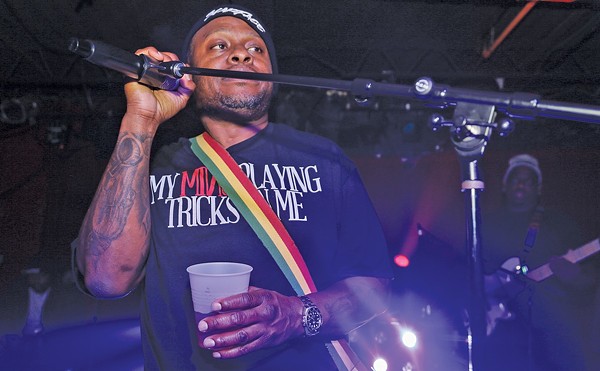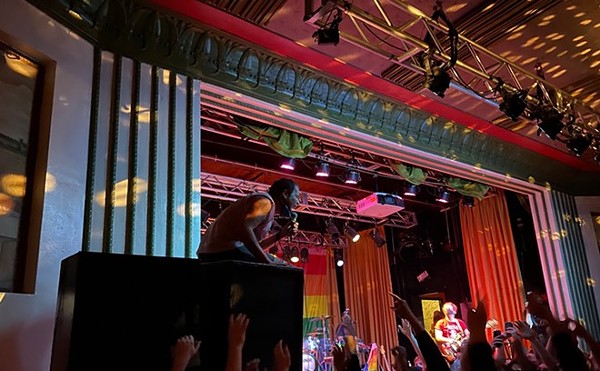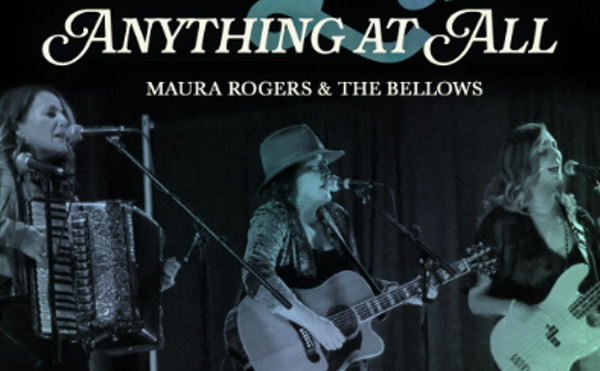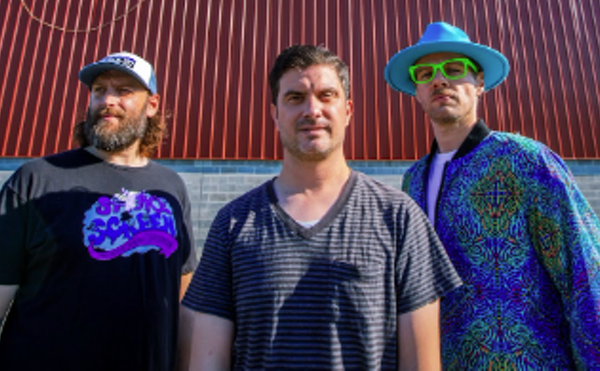But even though they work in a more recently created genre, it's just as difficult to determine definitively whether Prince Paul and Dan "the Automator" Nakamura originated the hip-hop concept album. The best argument might actually belong to the late, large Fat Boys, who dropped the "rappera" On and On on an unsuspecting -- and uncaring -- public back in 1989.
But Dan and Paul have undeniably set the gold standard for heady hip-hop. Individually, each has racked up a series of high-concept projects -- the Automator's cartoon band Gorillaz and Paul's Prince Among Thieves (a true "rappera," with a compelling, coherent storyline) being only the best examples.
Their pièce de résistance, however, is their collaboration as Handsome Boy Modeling School, which takes its name from an episode of Chris Elliott's sitcom Get a Life and recasts the two superproducers as stylish studs Nathaniel Merriweather and Chest Rockwell. Together, they're proprietors of the world's most exclusive charm school, clad in smoking jackets and fake mustaches. It's a scenario that allowed the pair to mix and match the contents of their sizable Rolodexes to great effect on their 1999 debut So . . . How's Your Girl?, which featured pals Mike D, Sean Lennon, and Alec Empire. And last year's follow-up, White People, enrolled an even more eclectic student body -- from Pharrell to Cat Power.
The idea is such a brilliant goof that it often extends to the interview process, but Nakamura starts today by playing it straight, offering a refreshingly direct explanation for the duo's fondness for conceptual pieces.
"The concepts tend to be the last part of the record for us. It's not really what we base the record on," he says. "But speaking for myself and hopefully for Chest also, I'm a big record buyer. I go to the store all my life and buy records. But by the late '90s, the industry was so focused on singles that you only had to have one or two songs, and the rest was just crap. And when I buy a record like that . . . I feel like I'm getting got.
"We try to make works where every song has its merit," Nakamura continues. "And the way we make works is to make something people will listen to, hopefully, from the front to the back. And to make it work that way, we like to tie it together so it has some continuous flow."
But while it has the same try-anything guest list as its predecessor, White People faces trickier segues. There are more serious themes and songs -- "Greatest Mistake," a lovely soul duet between John Oates and Brit singer-pianist Jamie Cullum, for example. Skits with SNL alums Tim Meadows and Father Guido Sarducci are counterweighted by numbers like the mournful, antiwar reggae of "The World's Gone Mad," complicating the breezy fun of the debut.
The not-sure-whether-to-laugh dilemma even extends to Nakamura's answers, which slip in and out of character: He gives a passionate and plausible explanation of Handsome Boy as the true heirs of hip-hop's early, adventurous aesthetic, then launches into a deliberately nonsensical discussion of "handsomeness." ("We didn't invent it. It was around before, and we're gonna pass the torch on to somebody else . . . in 50 or 60 years.")
When Prince Paul joins the conversation, the balance is tipped, and a series of smoothly oiled one-liners follow. Nakamura gleefully explains that Oates was enlisted because he has "the greatest mustache in music."
"You know, he didn't have it when he came to the Handsome Boy Modeling School," admits Nakamura. "But just watch when you see him in the next few months!"
"You can watch it grow like a Chia Pet," adds Prince Paul, cackling.
He and Nakamura held a couple of dinner parties for prospective collaborators, Paul says, then simply watched people pair up. "You look outta the corner of your eye, and you see, I don't know . . . Mars Volta and RZA talking --"
"Comparing clothes sizes, I believe," Nakamura jokes.
"-- and you think, 'Hey, this might work!'" Paul concludes.
In fact, Nakamura says, nearly everything they experimented with during the making of White People bore fruit, making it tough to pick a favorite moment. "It's like when I go over to Chest's house and he's got four women there -- which one is the most beautiful?"
"Exactly," deadpans Paul. "The blonde, the brunette, the redhead, the black-haired one . . ."
The Frank-and-Dino-style banter makes one wonder whether there's a Vegas stop on the duo's current tour itinerary. Regardless, getting the guest-packed White People to go over live will be no small feat. To compensate for the Handsome Boy grads who will be unable to attend, there'll be computers, video shot from the stage, a live band, and even a host (the rotund, faux-British-accented Manfred Winters).
Nakamura says a "core group" of three guests will appear at the shows, possibly augmented by another artist or two, but he declines to name names: "Aw, man, if we told you that, there'd be no excitement!"
What he and Paul will disclose, however, is the influence they believe they've had on hip-hop's recent wave of conceptual efforts, noting that they've collaborated with theoreticians like Mike Ladd and El-P.
"The Handsome Boy ethic," Nakamura says plummily, "usually rubs off."














